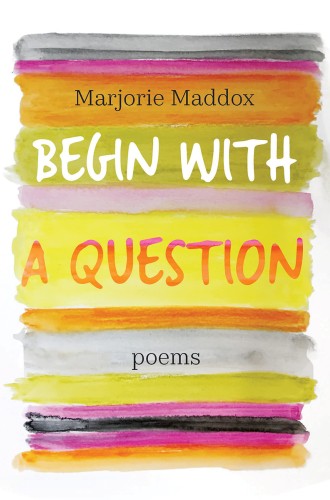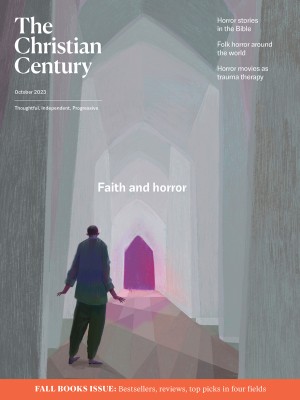Marjorie Maddox’s capacious poetry
She can (and will) do anything with this English language she so clearly loves.
Marjorie Maddox’s impressive new poetry collection suggests by its title that the reader is embarking on a journey. Maddox, who has produced 13 books of luminous poetry and teaches at Lock Haven University, has earned her credentials as an experienced guide. “Begin with a question” is a writing prompt; it is also, as we come to discover, a prompt applicable to living a life of faith.
The title poem is a sestina that begins—obediently? rebelliously?—with the most challenging of questions:
But why? By dawn, the day already
brims with answers: Yes, you may question
the universe; no, God will not answer;
yes, a double negative could mean maybe
this strange world cowers inside another Yes—
or not. What a knot of not-knowing creates our No’s.
Read our latest issue or browse back issues.
In this opening stanza, Maddox invites the reader to a dance of wordplay and wisdom, candor and humor. Moreover, we learn that our companion in this enterprise is herself a seeker so that when, later in the book, she leads us into hard territory, we willingly follow. As the sestina winds through its seven stanzas, it demonstrates what can happen to a simple question. Twists, bewilderments, and caveats accumulate, and much as we might want to hold tight to a simple, faithful Yes, along the way Maybe rears its honest head, and No waits always in the wings.
Beyond the question in the opening line, there is only one actual question in this poem, the question Jesus asks of his disciples: “Who do you say that I am?” This question serves as a test case of sorts. The answer a person might offer at dawn when she rises “awash with hope” may feel by noon more like despair. As the poem ends, she may find that the simple authoritative answer she had hoped for has been transformed to the answer a mystic might offer: “Be still and know.”
This dazzling poem serves as a doorway to all that follows. When you enter the world of Maddox’s poetry, there is a certain pace, a certain playfulness. Her poems are fun the way a roller coaster is fun—when you know it has been thoroughly grounded in sound engineering. The substrata here are compassion, humility, and the kind of seriousness that bespeaks a mature morality. If the poems of the book’s first section aim to decenter us a bit with their multilayered use of language and their insistence on the uselessness of easy answers, it is because they speak to our time, with its shifting truthiness and habitual carelessness. Even if we ask the right questions, the moral landscape is difficult to navigate.
A poem that appears early in the book, “Gardens and Farms,” repeats the lesson from another angle. Gardens and farms are conventional places of safety, peace, and plenty, right? To add to our comfort, we see that this is an abecedarian poem, so we know we’re heading for Z in 26 steps. Maddox leads us from apples of temptation to the chicken/egg conundrum, and we feel safe. As Eden evolves into a perilous landscape of uppercase Good and Evil, advancing toward Labor and Mortality, all still seems in order. Even when, as the end approaches, we’re informed “The / Yolk’s on us,” glancing ahead we see apple-fed chickens will lead us to Zion. But no. Instead, we’re back to A, “again and again and again.” No end to this.
Maddox can (and will) do anything with this English language she so clearly loves. Her sleights of hand appear in poem after poem: wordplay, dualities (such as natural/supernatural), hesitations that honor uncertainty, puns, and loopy lists that land on how-on-earth-did-we-get-here? Gorgeous imagery and resonant musical lines inhabit a wide range of poems: both free verse and formal, including sonnets, pantoums, abecedarians, couplets strung onto a single rhyme, a nursery rhyme, and more. Phrases and images return in later poems to create a unity. (Remember those chickens? They return “In the over- / easy / messy chicken shit of the natural/ / super.”) By the end of this portion of the book, Maddox has cut our certainty out from under us and brought us to a new humility—and we’re smiling.
The most prevalent of the book’s delights (and perhaps most necessary to its intent) is Maddox’s ability to weave into the poems bits of scripture, phrases from a hymnal or prayer book, tales of saints, and quotations from poems Christians have held dear through the centuries. Maddox’s knowledge is vast, but she never forgets we live in the real world: these poems are capacious enough to contain lockdowns, haircuts, school buses, Post-it notes, and virtual tours. We recognize this world.
The poems in the book’s second section look closely at choice: not our monumental choices, but those small ones we agonize over and often regret, or the impossible ones that have no answer persuasive enough to last the night. There are poems here about our failure to take care of one another, about our propensity to feel wronged and resentful, about our sense that we will be forever inadequate to the task. Among these poems of misstep and mistakenness, the ones that touch me most deeply are those in which the central figure is simply tired: too tired to help, too tired to listen, too tired to notice another’s apparent need or even to ask, “How is it with you?” This too is a familiar inner landscape.
There is something else important and unexpected here: angels. They wing through this section of poems, guarding us, saving us, hovering above. Devils make an appearance as well, as do saints and choirs, the women of the Bible, and—wait? What world is this? You may decide, as I did, that this, too, is the real world. But it requires a poet like Maddox to help us to see it.
In a small, beautiful poem at the end of the book, “And All Shall Be Well,” Maddox reminds us again of the collection’s title. As before, the poet undercuts the prompt’s instruction: “This is the poem that doesn’t begin,” she begins. And here, with a reference to T. S. Eliot, is how the poem ends: “The middle is where we start from— / or the beginning, the surging and receding bringing us back again / to continuum. And we shall know the place for the first time.” Be still and know.






